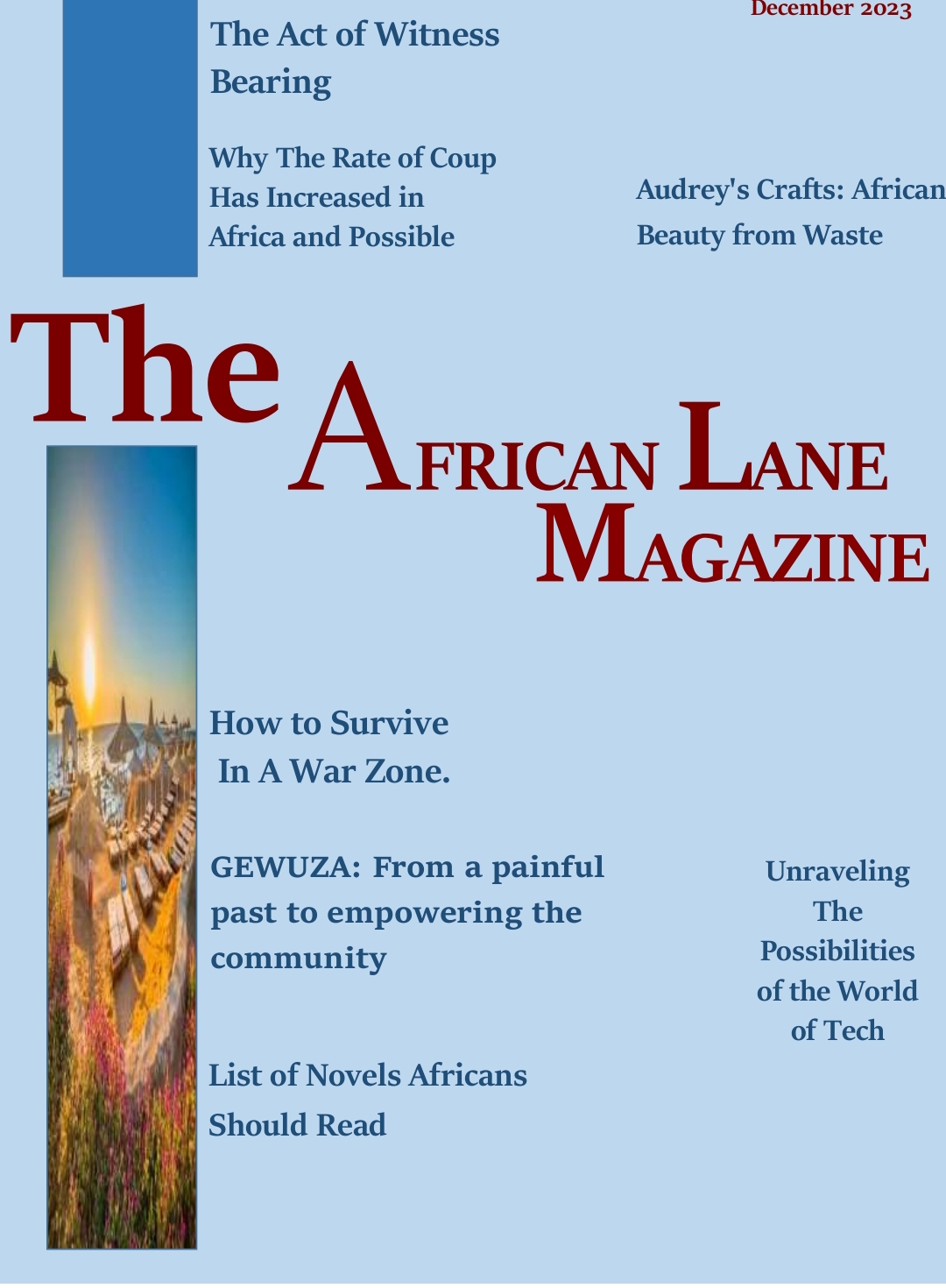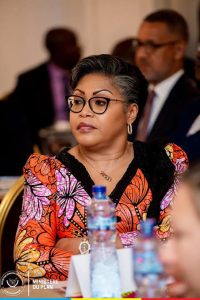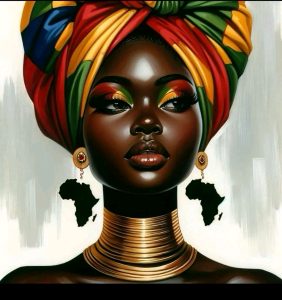FIFA Qatar World Cup: Rwandan Referee Salima Rhadia Makes History
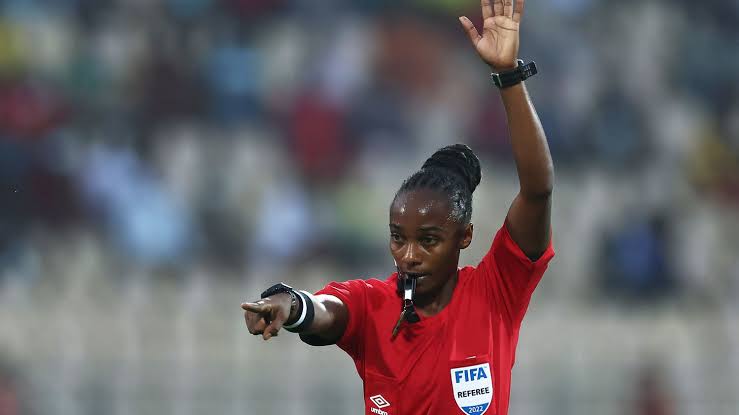
 Rwandan referee Salima Rhadia Mukansanga made history on Tuesday by becoming the first African woman to handle a World Cup game in its 92-year history after the 34-year-old was the fourth official, with defending champions France faced Australia
Rwandan referee Salima Rhadia Mukansanga made history on Tuesday by becoming the first African woman to handle a World Cup game in its 92-year history after the 34-year-old was the fourth official, with defending champions France faced Australia
France defeated Australia 4-1 at the Al Janoub Stadium in Al-Wakrah, with Olivier Giroud scoring a brace and one goal each from Rabiot and Mbappe, with the French side getting off to a winning campaign.
Salima Rhadia, a seasoned who has officiated at the Olympics, FIFA Women’s World Cup, CAF Women’s AFCON, and CAF Women’s Champions League became the first women referee to officiate at the 2022 TotalEnergies AFCON in January.
Her first assignment was the Group B encounter between Zimbabwe and Guinea with the Warriors claiming a 2-1 victory over the Syli Nationale at the Yaounde Ahmadou Ahidjo Stadium.
Born in 1998, and raised in Rusizi District, West Province, in Rwanda according to Rwanda’s New Times, her ambition while young was to become a basketball player, but that was not the case as she lacked a lot of basic needs including basketball facilities.

“I liked basketball, and wanted to take it very seriously, but access to basketball facilities and coaches was hard. That’s how I ended up refereeing, which I have also never regretted. I love it,” Mukansanga told New Times during an interview in 2019.
In 2004, Salima 2004, Salima Mukansanga was assigned the centre referee, her first time taking up the role during the CAF African Women’s Championship battle between Zambia and Tanzania. And she then, she has been amongst the top women referees on the continent.
“It is because of how I handled that match that I proved my ability to lead matches at any level on the continent. It was an exciting experience. Since that day, I have been trusted to officiate countless international matches in Africa and beyond,” she told New Times as quoted by Goal.
The Rwanda Football Administration tweeted two photos with the words: “Our very own Salima Rhadia, the fourth official of the France v Australia at the ongoing World Cup.”
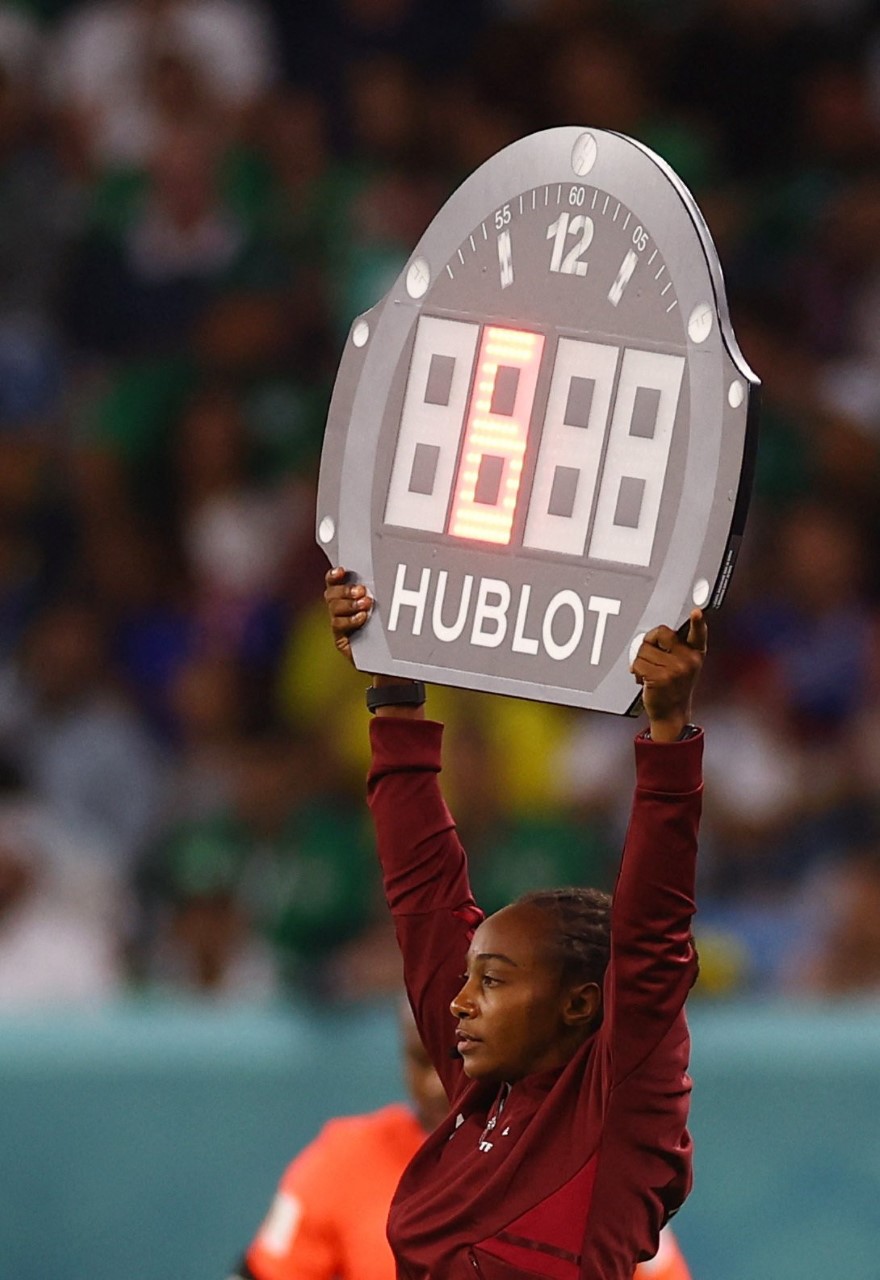
The reactions from fans and pundits have been pouring in. Usher Komugisha, an award-winning Football journalist said Salima’s exploits should be a drive to other women out there. She tweeted: “Dear African woman, hang this photo in your living room and tell your daughter, sister and friends that impossible is nothing. Super congratulations on becoming the first African female referee to officiate at the FIFA World Cup in 92 years. Very proud of you.”
“You all probably don’t understand that this right there is the biggest ever football competition, the biggest audience in the world. Salima Rhadia being here is a once-in-a-lifetime thing. Made us proud. There are no limits to a determined soul,” Erison Nshuti tweeted with a photo of the four officiating referees with Salima amongst them.
Salima Mukansanga hopes being one of six pioneering women – alongside fellow referees Stephanie Frappart and Yoshimi Yamashita and three assistant referees – in a men’s global tournament will create opportunities for more women.
“It’s an honour and a privilege because it’s never happened before,” Mukansanga told BBC Sport Africa
“It means you’re going to be the first one and going to open the door for other women, especially in Africa.
“You carry a lot on your shoulders and you need to carry it well, so others can see that the door is open and they can also go through.
“It means the opportunities are there – and it’s up to us to take them and become productive from them.”
How it All Started
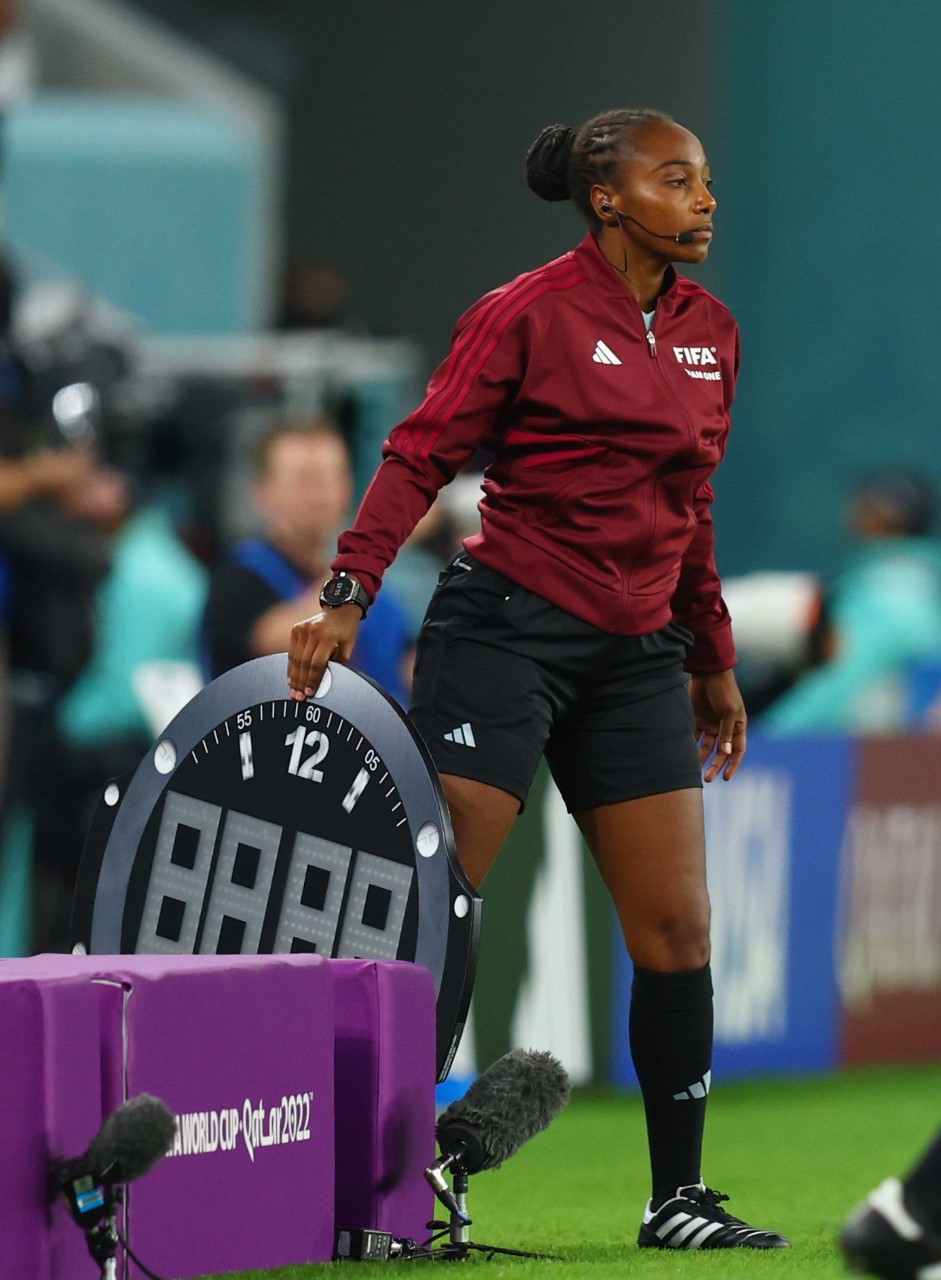
According to a BBC report As a young girl, Mukansanga chose to concentrate on football after being told she was not old enough to be part of a national Under-17 basketball side – but the latter sport ignited a fire within her.
“When I went to watch games, I saw these people inside the [court] called referees,” she explained at the Nations Cup in January.
“They could take decisions and change everything on the field of play, so I got excited and from that moment, while I was still in primary school, I started to think about those people.”
She started refereeing while in secondary school, on what was a rapid learning curve.
“I didn’t know there is a lot to do – laws to follow, a mentality to follow, a professionalism inside – but I started to learn step-by-step.
“It was very difficult. When you are reading the laws of the game, it’s easy to understand but inside the field of play, it needs some time to have a smell for the job.”
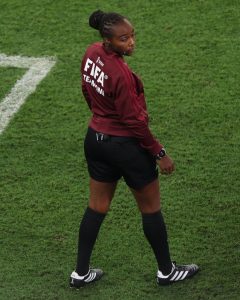
A short-lived spell as an amateur player led her across an advert announcing refereeing training, but after approaching the Rwandan FA (Ferwafa) about joining a referees’ course straight out of secondary school, she was again rejected for being too young.
So this softly-spoken, but determined individual, took matters into her own hands and taught herself Fifa’s Laws of the Game, with her hard graft rewarded when she was finally being given an opportunity to study with other aspiring referees by Ferwafa.
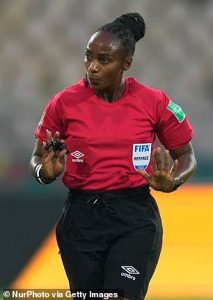
Mukansanga’s meandering journey has taken her from officiating men’s league games in Rwanda, to the 2016 Women’s Nations Cup, the 2019 Women’s World Cup and the Tokyo Olympics.
On 18 January, a bigger landmark- being in the middle for Zimbabwe’s win over Guinea – came during the men’s Nations Cup in Cameroon, with Mukansanga handing out six yellow cards and separating squabbling players in a creditable and composed performance.
“After the final whistle, I was really emotional – I was really very, very happy,” she told reporters at the time.
“I was not alone inside the field of play. That emotion came from my colleagues and it produced happiness – because we made history and made the game go smoothly.
“We deserve to be here. We have our background, and from that comes passion and hard work and this is the fruit.”
Savouring such sweetness had taken years of overcoming obstacles however.
Shortly after her Nations Cup landmark, Mukansanga – whose only job is refereeing – outlined some of the challenges she has faced to make it, ranging from sexual and cultural differences to basic biology.
“We have our period – so sometimes you can’t be able to run or officiate,” she explained.
“If pregnant – you can’t run. We give birth – so need time to recover, to prepare the body again for the next journey.
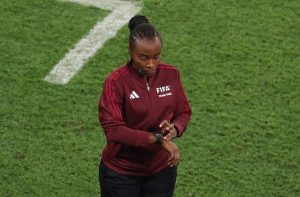
“Men’s speed is at a top level so sometimes I can’t run like men, but I can do more, push more to at least be on the same pace, have proximity with the players and a good angle of vision.”
Her training sessions and fitness tests are conducted alongside men, with Mukansanga overtly grateful to both Fifa and the Confederation of African Football (Caf) for their coaching classes.
Having dealt with an initially cold reception in the men’s game, the Rwandan – who makes quick decisions on the pitch – has embraced the challenges of the job.
“In a field dominated by men, you need to double your work – then have the passion, because without this passion you are going to get tired and then you leave it,” she explained.
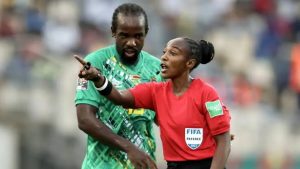
“But we don’t want to quit. We need to be one step ahead and work, succeed and fight together.”
Caf’s head refereeing instructor Jerome Damon believes Mukansanga has earned her stripes.
“It’s an absolutely amazing milestone – she is in a unique position where she is one of the few people able to go to a senior men’s World Cup and a senior Women’s World Cup,” said Damon.
“It hasn’t been done before, so that speaks volumes for refereeing and its development in Africa.”
Supporting women will ‘bear fruits’

IMAGE SOURCE,GETTY IMAGESYoshimi Yamashita (left) and Stephanie Frappart (right) will join Mukansanga as the first female referees at the men’s World Cup
Earlier this year, Fifa said the appointment of the female officials for the men’s World Cup, whose matches in Qatar have yet to be announced, concluded a “long process”.
“It is quality that counts for us and not gender,” continued Pierluigi Collina, the chairman of Fifa’s referees committee.
“I hope that in future, the selection of elite women’s match officials for important men’s competitions will be perceived as something normal.
“They deserve to be at the World Cup because they constantly perform at a really high level.”
Mukansanga will be joined in Qatar by France’s Frappart and Japan’s Yamashita, as well as assistant referees Neuza Back from Brazil, Karen Diaz Medina from Mexico and Kathryn Nesbitt from the United States.
“We are going to work together for the success of women,” Mukansanga said.
“If a woman is supporting another woman, of course you are going to see fruits.
“There are barriers, obstacles and challenges. There is nothing to do about them than for us to fight with a strong mentality, commitment and full engagement – then we will overcome.”
Mukansanga knows there will be extra scrutiny on her given the attention on football’s biggest tournament.

“People will never always be happy with you. So it’s up to you to do what you have to do – stay in the lines, don’t go out of the interpretation of the Laws of the Game and what the game demands.
“And then, at the end of the day, people will say: ‘Yes, she was right’.”
Sources: Panafricanvisions and BBC
